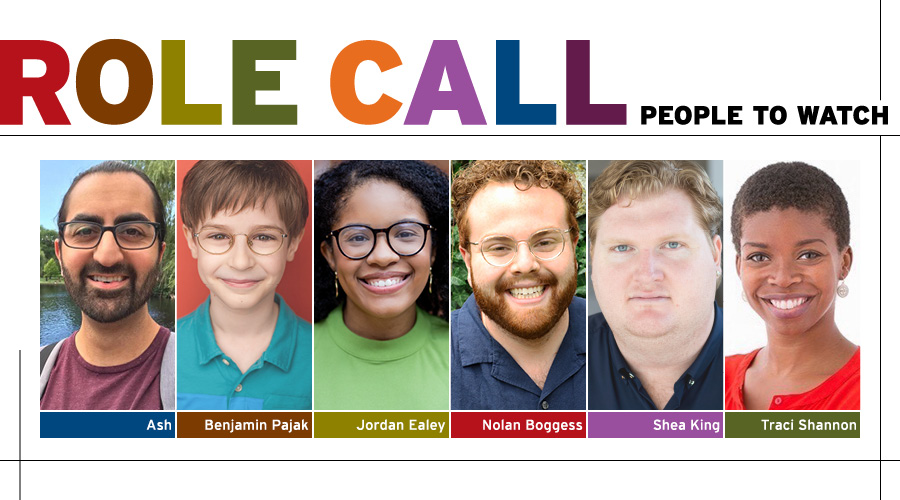If you would like to recommend a theatre artist for a future Role Call, fill out our open Google Form here.
Ash (they/them, she/her)

Profession: Composer, choral arranger, music director for choir and theatre, teaching artist, songwriter
Hometown and current home: Portland, Ore.
Known for: In addition to making theatre in Portland—they have extensive experience musicalizing Shakespeare, and their original music has won awards for their contributions to the Portland theatre landscape—Ash is artistic director of Transpose PDX, a nonprofit choral organization serving the transgender, non-binary, and gender non-conforming community of Portland. As a queer, non-binary, Persian, hard-of-hearing artist, they are also the committee co-chair of the Diversity, Equity, and Inclusion Committee for the Portland Gay Men’s Chorus, of which they are a singing member.
What makes them special: Director Avital Shira, who has worked with Ash closely for more than a decade, calls them “a visionary leader, a generous and insightful collaborator, and an ingenious composer. Each time I work with Ash to craft the musical journey of a piece on which we are working, I understand more deeply the essence of the story we are trying to tell…It is Ash’s music that unlocks the soul of the story.”
What the last two years were like: Like so many, Ash feels tired, and not only physically. “I’m tired of not seeing myself and any/all of my identities in art and media,” she said. “I’m tired of playing by the rules of a game that’s rigged, unjust, and unkind. So now I’m working on myself, for myself, and building art and art spaces that affirm the values I hold.”
What’s next: Ash’s original musical Crumbs, developed with a Regional Arts and Culture Council grant, is billed as “a fantastical prequel to the Hansel and Gretel fairy tale,” in a version that “tackles cis-heteronormative models of family, examines how queer and trans identities are affected by external fear, and explores racial/cultural privileges around status, image, and authenticity.”
Better and better: For Ash, theatre “can be revolutionary, individually and community-wide. I revere that power, and I strive to lend my artistic voice to the reimagining of a better world—a world that sees, frees, and inspires us.”
Benjamin Pajak (he/him)

Profession: Actor
Hometown: Westfield, N.J.
Current home: New York City
Known for: Currently starring as Winthrop in The Music Man on Broadway, Pajak could also be seen in an Etrade commercial during the 2021 Super Bowl.
What makes him special: Music Man reviews have been mixed but not about Pajak, who has been called “a treasure” by Time Out NY, “a charmer” by the Wrap, and “delightful” by The Hollywood Reporter. Possibly most impressive of all, Slant called him a “sweetly sophisticated young actor.” Music Man director Jerry Zaks is more straightforward, effusing, “Benjamin is an extraordinary young person. He is talented, hard-working, and kind. I love him.”
What the last two years were like: Cast in The Music Man just before the pandemic started, Pajak spent the intervening time studying the part of Winthrop and working to keep his skills fresh with teachers and fellow performers. When it came time to return to in-person rehearsal, Pajak confesses, “I was screaming with excitement—my dream had come true!”
What’s next: In a case of life imitating art, Pajak started playing the cornet for the show, which he calls “the greatest gift.” He hopes to graduate “to a real trumpet by the end of June!”
Transformation and meditation: He caught the theatre bug in his first role, Captain Hook (“I just loved playing the villain”), and continues to relish “the feeling of transforming into someone else, and to find parts of myself that I can use in these roles. For me, acting is almost like a meditative process—it’s where I feel calm and everything makes sense.”
Nolan Boggess (he/him)
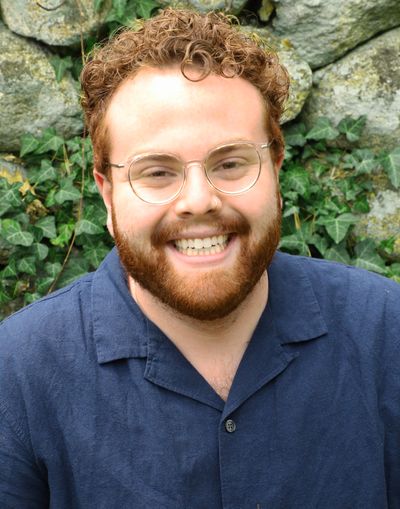
Profession: Director, production manager, COVID safety manager
Hometown: Des Moines, Iowa
Current home: Brooklyn
Known for: After spending some years creating outdoor, immersive theatre at Plimoth Patuxet Museums, a living history museum in Massachusetts (“If you ever need 17th-century trivia, I am your guy,” he quips), and working in production management for the Public Theater’s Shakespeare in the Park and the Under the Radar Festival, Boggess is now getting hired for a job “I never would have dreamed of existing,” COVID safety manager. He did the honors for Dana H and Is This A Room when they ran in rep on Broadway last fall, and he’s worked in this capacity on a few workshops, including the Broadway-bound The Devil Wears Prada. With Blane Barton as COVID safety manager, Boggess is now working as COVID safety supervisor for the Lincoln Center Theater production of The Skin of Our Teeth.
What makes him special: Gabby Beans, who’s starring as Sabina in Skin, said that Boggess’s “background as a theatremaker gives him a degree of insight and sensitivity around the COVID concerns of the company that has been indispensable within our process. His efficiency, knowledge, and professionalism puts us all at ease and creates an optimal environment for play and creative discovery.”
What the last two years were like: Boggess says he’s become acutely “aware of the space I take up in a theatrical work environment,” and is “learning how to be a better listener and more deliberate with my words/silence.” One challenge, he admits: “I often find myself struggling to be a supportive presence in a room when I am a daily reminder of the grim reality we have all lived with for two-plus years.” He remembers “being met with panicked faces after approaching a group of actors to simply make small talk” at the first rehearsal of Is This A Room. He knows he’s not alone: “A lot of people are struggling with trust right now, so I am trying to be a trustworthy presence, especially when dealing with an individual’s health.”
What’s next: “When I am not testing individuals for COVID,” Boggess says, “I am trying to keep creative projects alive on the side. I am currently working on a semi-autobiographical show dissecting why there are so many musicals about lonely women in Iowa, my home state. Growing up as a queer, theatre-obsessed kid, these women were everything to me.”
Better than Cats: In an early sign of his future life, Boggess was 2 when he asked for the VHS of Cats for Christmas. Maybe that’s where he got his taste for “the impossible onstage: illusions, epic scenery, 11 o’clock numbers belted for dear life. If I leave a show wondering, how did they do that?, it was worth the price of admission.”
Jordan Ealey (they/them, she/her)
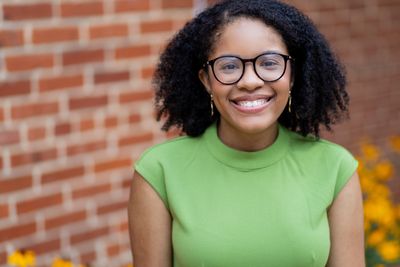
Profession: Dramaturg, playwright, scholar
Hometown: Atlanta
Current home: Baltimore, Md./Washington, D.C.
Known for: As a dramaturg, they worked on Lauren Gunderson and Ari Afsar’s We Won’t Sleep and Anita Gonzalez and Diana Lawrence’s Zora On My Mind. They have also been the co-host and co-creator of Daughters of Lorraine, a black feminist theatre podcast supported by HowlRound Theatre Commons, and are currently a Ph.D. candidate in Theatre and Performance Studies at the University of Maryland, College Park.
What makes them special: Lindsey R. Barr, a fellow dramaturgy student at University of Maryland, called Ealey “one of the most thoughtful, rigorous, and insightful people I’ve worked with. The wit they naturally possess comes through in their work, which is a delightful breath of fresh air. As a scholar and cultural critic, Jordan is expanding the fields of dramaturgy and musical theatre by interrogating the consequences of the cis, hetero, white lens often used to situate musical theatre writ large…No detail is too small for them to consider, and their ability to collaborate equally with every person in the room makes their contributions truly unquantifiable in any process.”
What the last two years have been like: Ealey confesses that “the years spent in lockdown and doing remote work did wonders for my career. How awful is that?” This happened, they think, because “the conditions created by the pandemic forced theatre leaders to move away from their usual networks and offer opportunities to newer and emerging artists.” She has also found herself to be more exacting about what kind of theatre she wants to be a part of; no longer so easily dazzled by theatre’s magic, she is instead prioritizing “work that speaks to that intersection of art and politics. I want to be a part of work with a strong point of view and an ethical commitment to radical change. Whenever I engage theatre either as an artist or as an audience member, I am constantly asking: Wat is this doing beyond the theatre? How is this changing culture?”
What’s next: While they work on what they call their “biggest, most daunting project”—a dissertation on Black women-created musicals—Ealey is readying the next season of Daughters of Lorraine (back this summer!), working as lead dramaturg for Mosaic Theatre Company’s H Street Oral History Project, and rediscovering their voice as a playwright with Single Carrot Theatre’s Unmarked project.
Blank check: Ealey came to the theatre through dance, and she stays, she says, “because there is nothing more invigorating and exciting than the possibilities of a blank stage. My ideal theatre is one where a rigorous, creative, and collaborative environment is not financially, emotionally, and spiritually costly to artists, and one that can serve the public as both an artistic haven and a social safety net.”
Shea King (he/him)
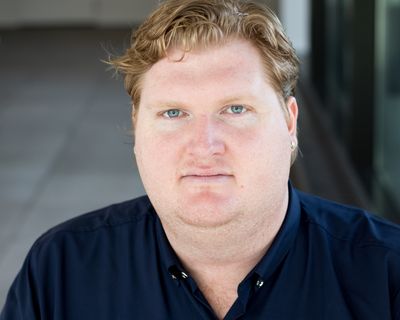
Profession: Director, teaching artist
Hometown: Los Banos, Calif.
Current home: Pasco, Wash., on the unceded land of the Cayuse, Umatilla, and Walla Walla peoples
Known for: King is on the theatre arts faculty of Columbia Basin College in Pasco, Wash., and also serves as the Irene Ryan Coordinator for the Kennedy Center American College Theatre Festival (KCACTF) Region 7. Directing credits include Matthew Lopez’s The Legend of Georgia McBride at Redwood Curtain Theatre in Eureka, Calif., and a staged reading of Steve Yockey’s To Tokyo and the Moon for KCACTF.
What makes him special: Kelly Quinnett, head of acting at the University of Idaho, enthuses, “Shea is an uplifter!” In his work at Columbia Basin and with KCACTF, she added, King “recognizes that everyone needs to be seen and acknowledged exactly as they are for their inherent goodness. No one is left unseen by Shea; therefore everyone is empowered in space.”
What the past two years have been like: The pandemic put a stop to the hustle for the next gig and led King to become “more mindful about the work I’m doing, especially with my students. I still believe live theatre can affect people and bring about change in our communities,” which is why, he says, “the specific stories I put out into the world have more thought put into them: Why this play, why now, and why this story in this community?”
What’s next: He’s currently directing Hand to God by Robert Askins at Columbia Basin College, followed by Beckett’s Happy Days at Snowy Range Summer Theatre in Laramie, Wyo.
You’re safe, but you can’t hide: As a queer kid growing up in a small town, theatre became “a space to be wholly myself.” It’s a home he wants to share. As he puts it, “Everyone has value in the theatre because we are all in service to the play, the story, to the lives of the characters. We are creating a gift of human experience for each audience member and collaborator. You cannot hide in the theatre, or else people cannot connect with your heart and intentions.”
Traci Shannon (she/her)
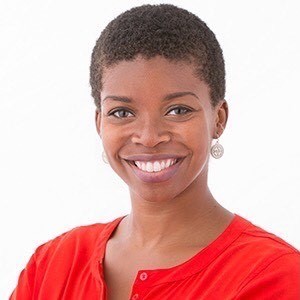
Profession: Theatre administrator, casting director
Hometown: Winston-Salem, N.C.
Current home: Minneapolis
Known for: Notable work as a performer includes the national tour of The Color Purple, and various roles in Twin Cities theatres, including Theater Latte Da, the Ordway Center for the Performing Arts, Park Square Theatre, Pillsbury House Theatre, and Children’s Theatre Company, where she was just hired as the theatre’s first full-time casting director.
What makes her special: “I first met Traci at Howard University during our audition process for our Performing Apprentice Program,” says CTC artistic director Peter Brosius, and the young performer “stood out there for her incredible talent, energy, and warmth.” She later worked at CTC a performing apprentice, then joined the theatre’s acting company, then left to start a family. The new role at CTC is a sort of homecoming, then; as Brosius puts it, “We are so excited to have her insights, her critical thinking, and her generosity of spirit infusing and informing our casting process.”
What the last few years have been like: From the pandemic lockdown and social upheaval, Shannon says she’s learned “that the human experience is entirely universal, and that that experience doesn’t stop simply because we’re at work or at home or find ourselves in a setting where deep and moving experiences may seem inconvenient. We must hold space for ourselves and for others to be entirely human, and we must hold each other’s humanity as sacred. In order to do that we have to stretch our expressions of grace, empathy, and compassion beyond what may seem comfortable.”
Rush tickets: Does the world need theatre? One might argue that the answer is no, Shannon says, “at least not in the same way that the world needs science or medicine. And yet the theatre is one of the only spaces I can think of where compassion, empathy, joy, and sorrow remain on full display,” a space that “unapologetically asks us to feel and engage in a common experience with the stranger sitting next to us. And we, as consumers of theatre, happily oblige, because when we do we feel the rush of being alive. I’ll always come back for more of that!”

